BMW i7 vs Mercedes E-Class Wagon – Which model is better for everyday use?
Everyday use, family trips or long-distance drives – here’s where the differences show.
Discover whether BMW i7 or Mercedes E-Class Wagon fits your lifestyle better.
Costs and Efficiency:
Looking at overall running costs, both models reveal some interesting differences in everyday economy.
Mercedes E-Class Wagon has a convincingly advantage in terms of price – it starts at 52600 £, while the BMW i7 costs 99200 £. That’s a price difference of around 46539 £.
As for range, the BMW i7 performs convincingly better – achieving up to 624 km, about 515 km more than the Mercedes E-Class Wagon.
Engine and Performance:
Power, torque and acceleration are the classic benchmarks for car enthusiasts – and here, some clear differences start to show.
When it comes to engine power, the BMW i7 has a somewhat edge – offering 659 HP compared to 585 HP. That’s roughly 74 HP more horsepower.
In acceleration from 0 to 100 km/h, the BMW i7 is slightly quicker – completing the sprint in 3.70 s, while the Mercedes E-Class Wagon takes 4.10 s. That’s about 0.40 s faster.
There’s no difference in top speed – both reach 250 km/h.
There’s also a difference in torque: BMW i7 pulls noticeable stronger with 1100 Nm compared to 750 Nm. That’s about 350 Nm difference.
Space and Everyday Use:
Whether family car or daily driver – which one offers more room, flexibility and comfort?
Both vehicles offer seating for 5 people.
In curb weight, Mercedes E-Class Wagon is noticeable lighter – 1900 kg compared to 2595 kg. The difference is around 695 kg.
In terms of boot space, the Mercedes E-Class Wagon offers to a small extent more room – 615 L compared to 500 L. That’s a difference of about 115 L.
When it comes to payload, Mercedes E-Class Wagon to a small extent takes the win – 645 kg compared to 535 kg. That’s a difference of about 110 kg.
Who comes out on top?
Overall, the BMW i7 shows itself to be outperforms in nearly all aspects and secures the title of DriveDuel Champion.
It convinces with the more balanced overall package and proves to be the more versatile choice for everyday use.
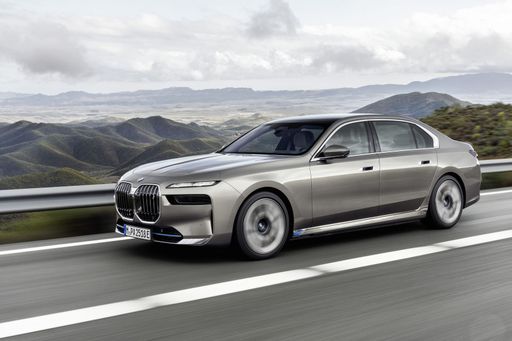
BMW i7
BMW i7
The new BMW i7 epitomises luxury and innovation, seamlessly blending advanced technology with elegant design. Its interior offers an unparalleled experience, with premium materials and cutting-edge features that create a tranquil yet engaging atmosphere for both driver and passengers. The i7's performance is both dynamic and efficient, demonstrating BMW's commitment to sustainable driving without compromising on the exhilarating drive the brand is known for.
details @ press.bmwgroup.com
@ press.bmwgroup.com
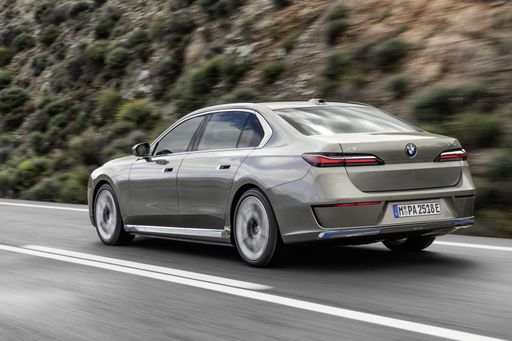 @ press.bmwgroup.com
@ press.bmwgroup.com
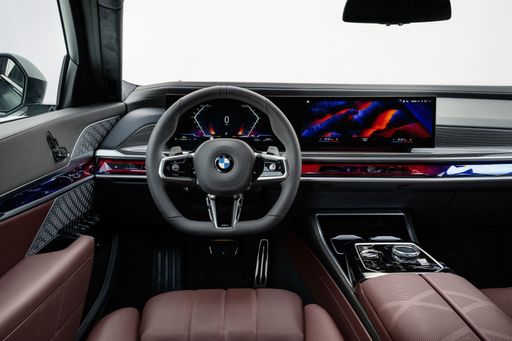 @ press.bmwgroup.com
@ press.bmwgroup.com
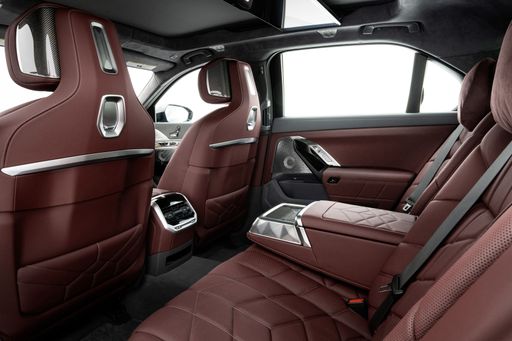 @ press.bmwgroup.com
@ press.bmwgroup.com
Mercedes E-Class Wagon
The Mercedes-Benz E-Class Wagon offers a harmonious blend of luxury and practicality, making it a favourite for those who value both style and functionality. Its sleek exterior design is matched by a sophisticated interior that provides a comfortable and spacious environment for both driver and passengers. This vehicle also boasts advanced technology features, ensuring a smooth and connected driving experience.
details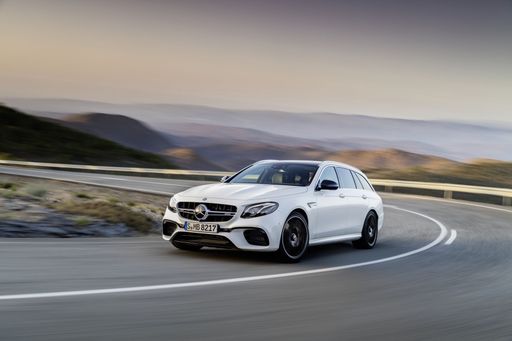 @ group-media.mercedes-benz.com
@ group-media.mercedes-benz.com
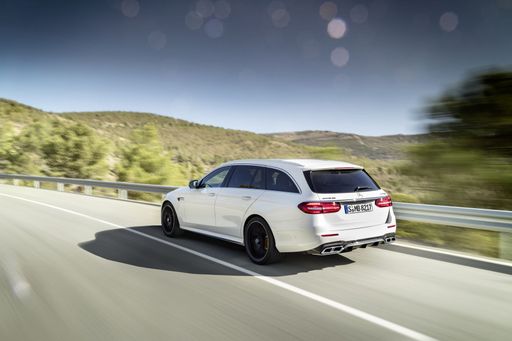 @ group-media.mercedes-benz.com
@ group-media.mercedes-benz.com
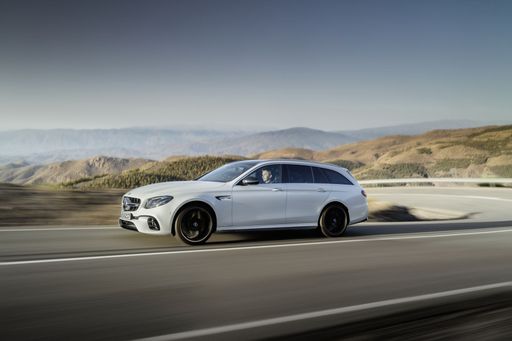 @ group-media.mercedes-benz.com
@ group-media.mercedes-benz.com
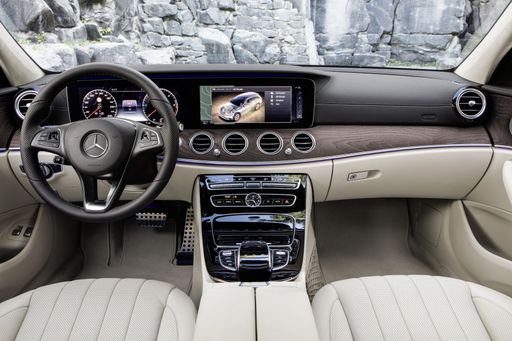 @ group-media.mercedes-benz.com
@ group-media.mercedes-benz.com

|

|
|
|
|
Costs and Consumption |
|
|---|---|
|
Price
99200 - 157000 £
|
Price
52600 - 121800 £
|
|
Consumption L/100km
-
|
Consumption L/100km
1.7 - 7.9 L
|
|
Consumption kWh/100km
18.5 - 20.8 kWh
|
Consumption kWh/100km
-
|
|
Electric Range
559 - 624 km
|
Electric Range
97 - 109 km
|
|
Battery Capacity
101.70 kWh
|
Battery Capacity
21.20 kWh
|
|
co2
0 g/km
|
co2
44 - 181 g/km
|
|
Fuel tank capacity
-
|
Fuel tank capacity
50 - 66 L
|
Dimensions and Body |
|
|---|---|
|
Body Type
Sedan
|
Body Type
Estate
|
|
Seats
5
|
Seats
5
|
|
Doors
4
|
Doors
5
|
|
Curb weight
2595 - 2770 kg
|
Curb weight
1900 - 2435 kg
|
|
Trunk capacity
500 L
|
Trunk capacity
460 - 615 L
|
|
Length
5391 mm
|
Length
4949 - 4959 mm
|
|
Width
1950 mm
|
Width
1880 mm
|
|
Height
1544 mm
|
Height
1469 - 1497 mm
|
|
Max trunk capacity
-
|
Max trunk capacity
1675 - 1830 L
|
|
Payload
480 - 535 kg
|
Payload
540 - 645 kg
|
Engine and Performance |
|
|---|---|
|
Engine Type
Electric
|
Engine Type
Petrol MHEV, Plugin Hybrid, Diesel MHEV
|
|
Transmission
Automatic
|
Transmission
Automatic
|
|
Transmission Detail
Reduction Gearbox
|
Transmission Detail
Automatic Gearbox
|
|
Drive Type
Rear-Wheel Drive, All-Wheel Drive
|
Drive Type
All-Wheel Drive, Rear-Wheel Drive
|
|
Power HP
455 - 659 HP
|
Power HP
186 - 585 HP
|
|
Acceleration 0-100km/h
3.7 - 5.5 s
|
Acceleration 0-100km/h
4.1 - 8.8 s
|
|
Max Speed
205 - 250 km/h
|
Max Speed
213 - 250 km/h
|
|
Torque
650 - 1100 Nm
|
Torque
320 - 750 Nm
|
|
Number of Cylinders
-
|
Number of Cylinders
4 - 6
|
|
Power kW
335 - 485 kW
|
Power kW
137 - 430 kW
|
|
Engine capacity
-
|
Engine capacity
1993 - 2999 cm3
|
General |
|
|---|---|
|
Model Year
2022 - 2023
|
Model Year
2024 - 2025
|
|
CO2 Efficiency Class
A
|
CO2 Efficiency Class
G, E, F, B, D
|
|
Brand
BMW
|
Brand
Mercedes-Benz
|
Is the BMW i7 offered with different drivetrains?
Available configurations include Rear-Wheel Drive or All-Wheel Drive.
The prices and data displayed are estimates based on German list prices and may vary by country. This information is not legally binding.
